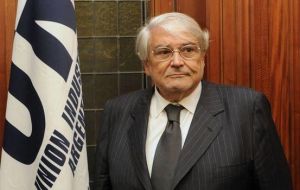MercoPress. South Atlantic News Agency
Argentina’s business sector does not expect major changes in economic policy
 Héctor Mendez, president of the Argentine Industrial Union
Héctor Mendez, president of the Argentine Industrial Union Argentina’s business sector does not expect major changes in the country’s current economic course following the death of former president Nestor Kirchner who was considered the man behind the scenes steering the main policy decisions.
“We don’t expect major in depth changes because the policy of President Cristina Fernandez de Kirchner is similar to that of the former president” said Hector Mendez, president of the powerful Argentine Industrial Union.
“We don’t know what she’ll do with the cabinet; we are going to see how the need for a new organization in cabinet is disturbed, if at all”, added the industrialist.
Since the sudden death of Kirchner last Wednesday there have been speculations in the Buenos Aires press of a possible change in the Economy ministry, currently occupied by Amado Boudou.
Mendez described Boudou as “quite orthodox” and a minister “who is not questioned by the business sector”. He added that “he did what was expected from him” taking into account that Nestor Kirchner “was in practical terms the shadow (Economy) minister who run the show”.
The Buenos Aires media has speculated with the possibility that the all powerful Planning Minister Julio de Vido, who manages huge public works funds and is the chief negotiator with the major sectors of the Argentine economy, could take on greater force in the cabinet, including “probably taking hold of the Economy ministry”.
However Mendez said that De Vido “has been a permanent referent for the business sector; a very important player who has always been open to dialogue”.
Mendez also confirmed contacts of the Industrial Union with the leader of the Trade Unions’ Confederation, teamster Hugo Moyano with the purpose of retaking dialogue, “lowering the level of confrontation and ensuring social peace”.
The two organizations have clashed over a bill to distribute a percentage of companies’ profits with workers and for unions to have full access to the numbers.
In related news De Vido interviewed by the Chilean media said there will be “absolutely no changes” in the government style and policies.
“She has taken her stance... and now she will certainly further pursue it” said De Vido. “(Kirchner and Fernández) were in synchronisation and had the same objectives. Obviously we’ve lost a soldier, but that doesn’t imply that we’re going to change our strategy,” he added.
Argentine bonds rallied after Kirchner’s death, based on hope among investors that her widow would take a less confrontational approach to the private sector and that alternative candidates might have a better chance in 2011.
But, emboldened by the economy’s strong growth and sympathy over Kirchner’s death, President Cristina Fernandez is expected to take a more aggressive stance to underline her authority. Her quick return to work and full activities (Monday) has been interpreted as a clear signal to avoid showing signs of weakness.
With the Argentine economy set to grow 9% this year, Fernández de Kirchner may see little reason to alter the state-centric polices and combative style that made investors wince but that brought success to the political partnership she shared with her husband.




Top Comments
Disclaimer & comment rulesCommenting for this story is now closed.
If you have a Facebook account, become a fan and comment on our Facebook Page!